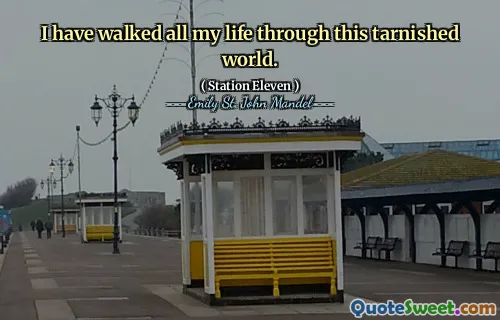Emily St. John Mandel is a Canadian author known for her thought-provoking and imaginative novels. Her most notable work, "Station Eleven," explores themes of survival and the enduring power of art in a post-apocalyptic world. The novel intertwines the lives of various characters before and after a global pandemic, revealing how human connections and culture can persist despite devastating circumstances. Mandel's storytelling captivates readers, drawing them into a complex web of narratives that reflect on both individual and collective experiences. Mandel's writing is characterized by its lyrical prose and deep emotional resonance. She often delves into the interplay between civilization, technology, and the fragility of life, encouraging readers to contemplate what truly matters in their lives. Her works, including novels like "The Glass Hotel" and "Sea of Tranquility," showcase her ability to blend speculative elements with realistic settings, further enriching her narratives. This unique approach resonates with audiences and critics alike, solidifying her as a significant voice in contemporary literature. In addition to her literary achievements, Mandel is recognized for her skillful world-building and intricate character development. She has garnered numerous awards and nominations, highlighting her contributions to fiction. As she continues to write and publish, Mandel remains committed to exploring complex human themes and crafting narratives that challenge readers to reflect on the nature of existence and the impact of choices made in their lives.
Emily St. John Mandel is an accomplished Canadian author best known for her captivating novels that delve into profound themes and human connections.
Her most famous work, "Station Eleven," examines survival and the power of art amidst a post-apocalyptic narrative, weaving together the lives of characters in a compelling manner.
With her unique blend of speculative elements and emotional depth, Mandel's stories invite readers to reflect on the fragility of life and the enduring nature of culture and relationships.
Loading...
More »
Today Birthdays
1965 -
Nicholas Sparks
1946 -
Diane von Furstenberg
1943 -
John Denver
1874 -
Holbrook Jackson
1830 -
Alexander Smith
1937 -
Anthony Hopkins
1908 -
Simon Wiesenthal
1941 -
Alex Ferguson
1878 -
Elizabeth Arden
1995 -
Gabby Douglas
1977 -
Psy
1944 -
Taylor Hackford
1964 -
Gong Li
1962 -
Lance Reddick
1880 -
George C. Marshall
1954 -
Eric Schneiderman
1990 -
Patrick Chan
1959 -
Val Kilmer
1943 -
Ben Kingsley
1950 -
George Thorogood
1948 -
Donna Summer
1963 -
Scott Ian
1953 -
Jane Badler
1958 -
Bebe Neuwirth
